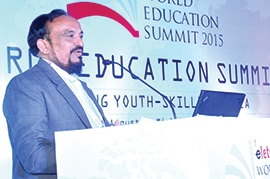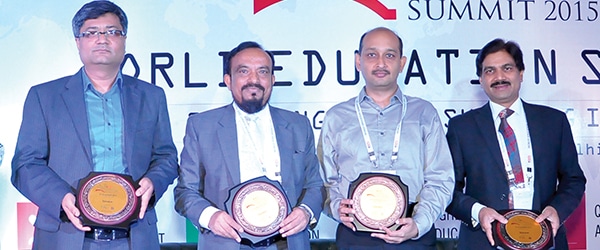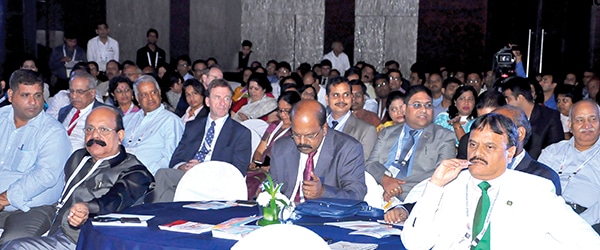
New Education Policy & Educational Reforms
Overhauling of the education system is the need of the hour. The new education reforms introduced by the Ministry of Human Resource Development will bring a change in the ailing system. Bhawna Satsangi of Elets News Network (ENN) writes about how industry experts feel about the grey areas of education and how new education policy will aid to make the system better
According to the New Education Policy, despite improvements in access and retention in elementary education, the learning outcomes for a majority of children continue to be an area of serious concern. According to a research, children are not learning the basic skills during their schooling. Many children who reach grade V cannot even read and do simple arithmetic calculations
Focusing to improve upon the education system in India, the Ministry of Human Resource Development calls for a revision of education policy. If India needs to excel in education and attain a vision, it is necessary to make reforms in the education policy to bring a change in the ailing education system. There must be a drastic overhaul of the education system running currently.
To meet the changing dynamics of the quality education, innovation and research, the New Education Policy aims to make India a knowledge superpower by equipping its students with the necessary skills and knowledge and to eliminate the manpower shortage in the field of science, technology, academics, and industry.
According to the New Education Policy, despite improvements in access and retention in elementary education, the learning outcomes for a majority of children continue to be an area of serious concern. According to a research, children are not learning the basic skills during their schooling. Many children who reach grade V cannot even read and do simple arithmetic calculations. The states are implementing reforms such as early grade reading, writing, comprehension and math programmes in conjunction with defining and measuring learning outcomes. The NCERT has completed three rounds of National Level Achievements Survey for Classes – III, V, & VII/VIII. States have been given funds to conduct state-level achievements surveys.
Digitisation is Imperative
To bring a change in the education structure, it is also essential to introduce digital learning to a great extent at the school level. The power of digital world can be used to really impart quality education, make change in the policy framework and enable credits to the students if they start using lectures on the MOOCs platform which can help them clear on the education space. “The right technology should be used to consider bandwidth issues and also help aspiring students’ population. Digital education is the key to success. The content has to be digitised and Microsoft sees that there is a huge momentum to start digital content,” says Pratik Mehta, Director, Education, Microsoft Corporation (India) Pvt. Ltd.
Digital Education has six Parameters
Digitisation of Content: Government of India has recently rolled out digitisation programmes like e-Bhasha, e-Basta and e-Pathshala, which are digitising all the NCERT books. As similar programmes are being taken over by some state governments also.
Learning Mobility: We believe that education is what is taught within the classroom. While its important that teaching needs to be done within the classroom, there is enough learning that can also be grasped beyond the classroom, which means that students should get the similar experience beyond the classroom to understand the things much better.
Skills and Employability: The reality of the ground today is that we as parents believe that we need to send students to school not to learn but actually to earn. Today, skilling has to be related to employability which is very important. There is enough unemployment in the country. The big gap between industry and academics needs to be bridged.
Economic imperatives: It enables basic education to those who are not able to go to school regularly. There are options available by which students can enrich their knowledge.
Ubiquitous Access: If students start unleashing the power of devices like tablet, smartphone, television, it will make an impact on learning.
Cloud Computing: The beauty of cloud computing is that the content is available at one central location which can be consumed by anytime, anywhere.
These parameters are critical to improve the quality of education and the government is seriously focusing on them to bring a revolution in the education at the school level. IT today has become an important ingredient in education.

Principal Secretary, Department of School Education, Government of Punjab
Universalisation of Education
With Universal Elementary education becoming a reality, near universalisation of secondary education is the next logical step. Further, universalisation of quality secondary education implies creating secondary schooling provisions of a defined standard irrespective of the location and management of the institution to accommodate all those eligible grade VIII and grade X students, who are willing to participate in the secondary and higher secondary education.
A wide range of centrally sponsored schemes are being run by different secondary school institutions and bodies so as to ensure greater geographical coverage, social and gender inclusion and use of ICT for quality enhancement.

Chairman, CISCE, speaks about teacher quality concerns at WES 2015
“There is lot to be achieved in the educational sphere. Under the present circumstances and polished framework, it is inadequate to bring all the children to school. The kind of framework we have, we lack in enrolling millions of children. Do we have a regulatory framework to punish parents who do not send their children to school? To address this, we have to make an effort to ensure that each and every child should attend school. The regulatory framework should be developed in such a manner that all children should go to school,” feels C Roul, Principal Secretary, Department of School Education, Government of Punjab.
Teacher Quality Concerns
The dropout ratio in school is increasing tremendously in rural and government schools. To address this issue, there are certain parameters to be taken care of like environmental issue, language of medium of instructions, separate toilets for boys and girls, non-competence of teachers, etc.
Quality of teachers has been a major cause of worry in the country and one of the basic pre-requisites to improve quality of education. Competence of teachers and their motivation is crucial for improving the quality. Several initiatives are being taken for addressing shortages of secondary school teachers in mathematics, science and languages, improving the quality of pre-service teachers and in-service teachers professional development, enhancing the status of teaching as a profession, improving teachers’ motivation and their accountability for ensuring learning outcomes, and improving the quality of teacher education institutions and also teacher educators.
“Re-introducing education policy will not improve quality of education. It will not bring teacher accountability which is almost zero in all parts of the country,” said Roul. Inspite of several efforts by the Central and State governments issues of large number of vacancies in both elementary and secondary levels, problems of untrained teachers, lack of professionalism in teacher training institutions, mismatch in training and actual classroom practices, teacher absenteeism and teacher accountability and involvement of teachers in non-teaching activities needs to be addressed.
Teachers’ recruitment needs to be strengthened and merit based. Teacher’s training is also essential part to improve the quality of education. “The current education system, based on the erstwhile British Macaulay system of things, is not the best way of going. We are not creating real learners. IT needs to be integrated. We should not go back to the old slate, board or textbook versions. We need to go ahead. But the inertia is not moving forward,” reminisces Subrat Sahoo, Secretary, Department of School Education, Government of Chhattisgarh.
In Chhattisgarh, the department of education has taken a few initiatives which are path breaking.
For teachers’ training, other than the normal methods of ODL and regular teaching, a certificate course has been introduced. The teacher does not have to come to the SCERT or the DIET or to any teaching platform. They have to attend a one day orientation course and from their own place of posting they will be assessed at 15 days’ intervals over a period of three months. These 15 days period is also flexible and the teacher is free to take it as per his/her convenience.
Parents’ Interaction: The main reason parents don’t send children to government schools is because of the falling standards of schools and teachers. They prefer to send their children to private school and they are accustomed to demand children’s right. This economics is missing in the government schools.
Vocational Education: Not every place in Chhattisgarh has connectivity. The education department thinks about strengthening vocational education but not every place has a capacity to give vocational training. In this backdrop Chhattisgarh is the first state to inact and act which gives the student who has passed class VIII the right to acquire a skill. The right to skill development is an act which guarantees an applicant that within 90 days of the application, the department will give training in a skill, out of 52 possible skills options available.
“There is a rapid change in innovation and technology. We are educators and teaching our children to get into job which will exist in future. We are trying to make our children learn to use technology and solve the problems because constantly time is changing,” says Dr G Immanuel, Chairman, CISCE.
ICT can potentially make significant difference in improving the quality of education. The National Policy of ICT in School Education envisions and provides for the development of a holistic framework of ICT support in the school system. Mission Mode Project (MMP) on School Education would enable comprehensive technology enablement of the school education sector.























